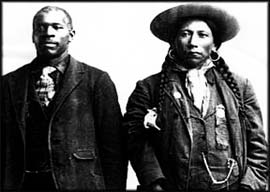
August 25, 2011

“I think that is horrible, I think it’s deplorable, I think it is unjust. And a travesty of justice,” said Kenneth Payton, a black man who says he’s upset that the wagon-burners have cut off his gravy train. “It’s my humane right. This is more of a human-rights issue than anything else. So this, to me, in my lifetime, this is the biggest human-rights issue,” said Payton, who added something about blacks and Injuns being part of a “big quilt”—one that is hopefully not infected with smallpox.
The Congressional Black Caucus and the National Congress of Black Women are also rankled about the recent decision, but to be honest, when aren’t they rankled?
The Cherokee tribe, whose chieftains have boasted such spicy monikers as Dennis Wolf Bushyhead and Wilma Mankiller, declared the black Freedmen to be Cherokee citizens as far back as 1863. In the intervening years, repeated attempts were made to distinguish those who were Cherokee “by blood” from those who were Cherokee in name only. The issue grew more complex in the 1970s when the federally funded Bureau of Indian Affairs extended financial benefits to all tribespersons, including the Freedmen. In the early 1980s, Chief Ross O. Swimmer issued an order that reserved Cherokee Nation voting rights only to those who could present a Certificate of Degree of Indian Blood, effectively snatching away the peace pipe from the Freedmen’s mouths.
The US government continues to fund the Cherokee Nation to the tune of about $300 million per annum. In 2006, a federal US judge ruled that the Freedmen’s descendants were entitled to sue for disenfranchisement. In 2007, Cherokee Nation voters lobbed a razor-edged tomahawk through that decision and by a 3-1 margin supported an amendment that defined a “Cherokee” only as someone with a Cherokee ancestor. Defending Monday’s ruling that upheld the 2007 amendment, Cherokee Nation Attorney General Diane Hammons explained that “you have to have just one ancestor that has some Indian blood. You have to be Indian to be a member of an Indian tribe.” Monday’s legal ruling includes several instances of the phrase “Cherokees by Blood.”
The Cherokees, may the Great Spirit bless their ruddy cojones, insist they have a sovereign right to determine tribal membership along genetic bloodlines. Such a sentiment seems simultaneously antiquated and refreshing. There are likely some economic reasons for denying tribal membership to the Freedmen, but there’s also an apparent will to preserve a genetic and cultural heritage that was nearly obliterated. For the Freedmen’s descendants, despite their yakety-yak about human rights, it strains belief to think they really care that much about sweat lodges and stomp dances. For them, it appears to be all about the wampum.